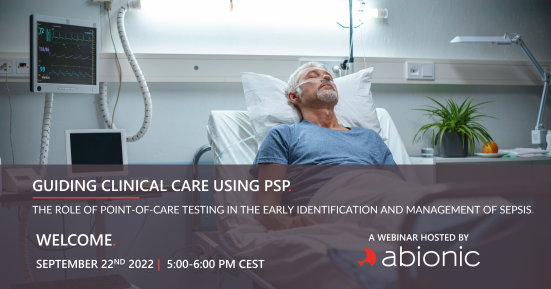
October 17th 2022,
The role of Point-of-Care Testing in the Early Identification and Management of Sepsis
Introduction & Welcome
On September 22nd, over 240 attendees from all over the world had the opportunity to connect and tune into this educational session along with interactive roundtable discussions, chaired and moderated by Prof. Jean-Louis Vincent, world-renowned expert in sepsis and professor of intensive care at the Erasme University Hospital in Brussels, Belgium. Three other expert physicians joined and completed this diverse faculty to share their experience and insights on using Pancreatic Stone Protein (PSP) at the Point-of-Care (POC) for intensive care unit (ICU)-patient management: Dr. Holger Klein, Chief Physician Plastic Surgery and Hand Surgery at the Kantonsspital in Aarau Switzerland; Dr. Gabriele Melegari, Medical Doctor in Anesthesia and Intensive Care at Ospedale di Baggiovara in Moderna Italy and Prof. Dr. Maria Lagadinou, Assistant Professor of Internal Medicine at the University Hospital of Patras in Greece.
Prof. Vincent opened the floor by highlighting that there is a “need for better biomarkers to identify sepsis, assess its severity and [..] which we can follow over time to individualize the duration of antibiotic therapy and ensure we are in the right direction with our current management.”
Dr. Holger Klein started off by providing an overview on the background of the biomarker, which was initially discovered in 1980 as “lithostathine”, thought to be an inhibitor of pancreatic stone formation, and thus giving the current name of the biomarker “Pancreatic Stone Protein”. PSP is a c-type lectin binding protein, which comes from a family of proteins knowingly involved in inflammatory processes during infection and septic events. Since 2009, PSP has been studied in several different patient cohorts, including critically ill, post-cardiac surgery, and severe burn patients. Findings in the presented literature were able to showcase some of the unique features of the biomarker: PSP is able to discriminate septic events from non-septic events in patients with high inflammatory stress levels and, in addition, significantly increases in blood levels up to 72h before clinically apparent manifestation of sepsis. This was not the case for other canonical biomarkers.
In addition these findings allowed to establish a certain understanding of the mechanism of PSP and how it works in the cascade of events that take place during an infection: upon remote sensing of organ dysfunction caused by an infection, the pancreas rapidly releases higher levels of PSP into the bloodstream where it is then involved in two immunological pathways, the first being direct aggregation and immobilization of bacteria and the second being the binding and subsequent activation of neutrophil granulocytes.
Dr. Klein closed this first lecture by concluding that “PSP is an upcoming promising biomarker for sepsis […] as it steeply increases before clinically proven sepsis and shows high level of robustness towards sterile inflammatory stimuli such as trauma itself or repetitive surgeries” and “that its use on the abioSCOPE® enables Point-of-Care diagnostics for our physicians in the ICU and even also in the emergency department”.
Dr. Melegari then followed-up with his lecture describing his experience using POC PSP in critically ill COVID-19 patients.
When describing the need for tools to help early detection of severe cases of COVID-19 (which is associated with a mortality rate of 30-50%), he underlined the need for “an ideal biomarker which should have high accuracy, predictive value, high sensitivity and specificity and be easy to perform”.
In his study aiming to evaluate the usefulness of biomarkers in the prediction of long-term mortality over 90 days in critical COVID-19 patients requiring ventilatory mechanical assistance, PSP performed better than CRP and PCT as a biomarker for disease progression and severity, regardless of the timepoint measurement. Results highlight the advantages of monitoring PSP levels in predicting long-term mortality with the help of a rapid point-of-care technology providing results at the bedside in under 10 minutes.
Following on from Dr. Melegari, Dr. Lagadinou shared her own experience using POC PSP in the management of critically ill COVID-19 patients. In a study aiming to evaluate the prognostic value of PSP in patients hospitalized with COVID-19, results demonstrated that “PSP measured on admission, could be used for identification of patients with SARS-CoV-2 pneumonia at highest risk of prolonged hospitalization reflecting more severe disease and the need for intensive treatment”, suggesting that “maybe we will be able to create a triage based on an easily measured biomarker […] to manage resources and apply earlier proper treatment”.
An interactive roundtable discussion followed all lectures where the faculty addressed questions coming directly from the attendees.
Dr. Klein mentioned that “the present data on PSP really supports the timely advantage of PSP for the early identification of sepsis” to which Prof. Vincent agreed that “a biomarker [with short half-life and which can be measured serially] able to help orient the patient management, to start or not to start antibiotics, or perhaps change the antibiotic, call for additional tests etc…these are very important implications!” in particular with the added advantage of being available with a POC technology at the bedside.
Regarding future perspectives, the faculty agreed that serial measurements of PSP may also have the potential to help in the decision-making process on whether to start/withhold antibiotic treatment, and thus reducing antimicrobial resistances. Future studies should help confirm this.
Authors:
Caroline Cateau, Medical Affairs Manager, Abionic SA